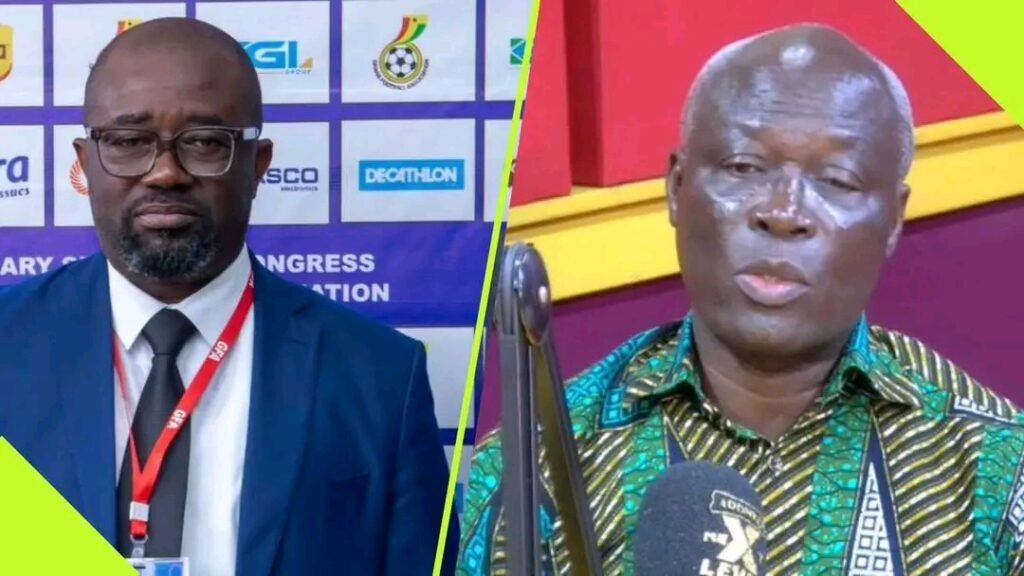
The performance of Ghana’s national football team in the Africa Cup of Nations has recently come under scrutiny, garnering widespread attention from both fans and analysts alike. Despite being a historic powerhouse in African football, the team has faced disappointment in recent tournaments, leading to discontent within their supporter base and calls for accountability. One notable critic is Nii Lante Vanderpuye, a former Member of Parliament and a staunch advocate for reform within Ghanaian football.
Vanderpuye has publicly attributed Ghana’s underwhelming results in the prestigious tournament to the management and operational strategies of the Ghana Football Association (GFA). His remarks reflect a growing frustration among stakeholders and football enthusiasts, as many believe that the GFA’s leadership has failed to provide the necessary support and resources to maximize the potential of the national team. Following a series of lackluster performances, including early exits in crucial matches, the urgency for a reevaluation of the GFA’s approach to team selection, training, and overall strategy has intensified.
This discontent has prompted significant discussions in various media platforms regarding the need for reforms within the association to enhance the national team’s competitive edge. Observers have noted that while the players possess talent and skill, their success is ultimately contingent upon effective governance and strategic planning within the GFA. Vanderpuye’s criticisms resonate with many who have witnessed the decline of Ghanaian football on the continental stage, emphasizing that constructive dialogue is necessary to address the challenges facing the sport in the country.
https://pagead2.googlesyndication.com/pagead/js/adsbygoogle.js?client=ca-pub-6874350719416603Ultimately, the importance of examining these criticisms cannot be understated, as they highlight underlying issues that may jeopardize the future success of the Ghana national football team in international competitions. The narrative surrounding the GFA’s role and responsibility in nurturing the country’s football talent is critical for fostering a renewed sense of ambition and purpose in Ghana’s quest for excellence.
Nii Lante Vanderpuye’s Claims Against GFA
Nii Lante Vanderpuye, a prominent figure in Ghanaian sports administration, has leveled serious accusations against the Ghana Football Association (GFA), asserting that their mismanagement significantly contributed to the national team’s failure in the recent Africa Cup of Nations. He has expressed concerns regarding the lack of strategic planning and ineffective leadership within the GFA, which he believes led to an inadequate preparation phase for the tournament. Vanderpuye emphasized that without proper planning, the team’s potential was undermined and chances of success were diminished.
One of the main claims made by Vanderpuye pertains to the negligence in player selection and training. He argues that the GFA failed to adequately assess the strengths and weaknesses of available players, leading to a squad that was ill-equipped to compete at the continental level. Vanderpuye posits that the coaching staff was not sufficiently supported, which ultimately resulted in tactical deficiencies on the field. Furthermore, he criticizes the GFA for not investing in modern training facilities and resources that could have enhanced player performance during the tournament.
Moreover, Vanderpuye points to systematic issues within the GFA that he believes hindered the team’s chances. He argues that infighting and lack of cohesion among the administration and coaching staff created a toxic environment that trickled down to the players. This, he insists, is reflective of a broader lack of accountability and transparency within the GFA’s operations. Vanderpuye’s statements have sparked debate among football fans and analysts alike about the need for a comprehensive overhaul of the Ghanaian football governance structure to prevent future failures. In light of these claims, the discussion surrounding reforming the GFA has become increasingly vital for the future of Ghanaian football.
Context of the Africa Cup of Nations Performance
Ghana’s participation in the Africa Cup of Nations (AFCON) has historically been marked by a blend of triumphs and disappointments. The Black Stars, as the national team is popularly known, have garnered considerable acclaim over the decades, boasting four championship titles. Yet, their recent performances have sparked significant scrutiny and debate among fans and analysts alike, particularly leading up to the latest edition of the tournament.
In the years preceding the most recent AFCON, Ghana’s footballing legacy has faced numerous challenges. The team reached the finals in 2010 and 2015 but fell short, resulting in an ongoing search for their fifth title. The sentiment surrounding the squad has become increasingly pessimistic, with supporters expressing frustrations towards the management and selection processes that appeared to stall progress. Notable defeats in the knockout stages, such as in 2019 when they were eliminated by Tunisia, have only fueled this discontent.
Player statistics have also played a significant role in shaping perceptions of Ghana’s strength in continental football. Star players like Thomas Partey and André Ayew, once considered cornerstones of the team, have faced immense pressure to deliver results. Despite having talented squads, a string of underwhelming performances has raised questions about the tactical approach and overall strategy implemented by the Ghana Football Association (GFA).
The general sentiment in the lead-up to the latest AFCON tournament reflected concerns over squad cohesion and the ability to compete against emerging football powers on the African continent. With the backdrop of these recent struggles, the accusations made by Nii Lante Vanderpuye regarding the GFA’s role in the team’s performance have ignited further discussions about accountability and the future direction of Ghanaian football.
The Response from the Ghana Football Association
In light of the accusations made by Nii Lante Vanderpuye regarding Ghana’s recent failures in the Africa Cup of Nations, the Ghana Football Association (GFA) has issued several statements to address these claims. Officials from the GFA have emphasized that the organization is committed to enhancing the performance of the national team and ensuring that all resources are adequately utilized to meet this goal. The response points to ongoing efforts in talent development, coaching, and infrastructure improvements as evidence of their dedication to football excellence in Ghana.
GFA officials have categorically rejected Vanderpuye’s allegations that mismanagement and poor decision-making are behind the team’s lackluster performances. Instead, they argue that the challenges faced in international competitions are multifaceted, often involving the complexity of player selection, injuries, and the tactical realities of facing formidable opponents. The GFA asserts that it regularly assesses the national team’s performance and implements necessary changes, focusing on both immediate results and long-term strategies to cultivate a competitive edge in future tournaments.
Moreover, current players and past legends of the national team have echoed the sentiments expressed by the GFA, urging football stakeholders to work collaboratively rather than assign blame. Many have pointed out that fan support and constructive criticism are crucial for the team’s growth, rather than public accusations that may further demoralize players and undermine their confidence. The GFA remains optimistic about Ghana’s prospects in upcoming competitions, arguing that unity and consistent support from fans and stakeholders are essential to the team’s trajectory towards reclaiming its former glory.
As discussions continue, the GFA is expected to maintain an open line of communication with the public, emphasizing transparency and accountability as key pillars in restoring confidence in Ghanaian football.
Comparative Analysis of Leadership in Sports
Leadership in sports, particularly in football associations, serves as a crucial determinant of success on the international stage. A comparative analysis reveals that effective governance structures not only bolster the performance of national teams but also enhance the overall integrity of the sport. For instance, countries with robust leadership frameworks often see a direct correlation between administrative efficacy and team success. In nations like Germany and France, smart strategic planning and investment in youth development have propelled their teams to notable achievements in major tournaments, including the Africa Cup of Nations and the FIFA World Cup. These countries exemplify how strong leadership driven by vision and accountability nurtures talent and builds comprehensive support systems.
Contrastingly, Ghana’s challenges in the Africa Cup of Nations underscore how poor leadership choices can stifle potential. The Ghana Football Association (GFA) has faced criticism regarding its governance, decision-making processes, and transparency, affecting both player morale and fan support. Lessons from well-governed football associations highlight the importance of stakeholder engagement and strategic foresight, which are crucial for fostering an environment conducive to success.
The role of leadership extends beyond the executive levels within these associations. Managers, coaches, and even players play vital roles in establishing a culture of excellence. By analyzing comparative leadership styles, we can observe that countries prioritizing a collaborative approach—encouraging input from various stakeholders—tend to cultivate resilience on and off the pitch. In this context, Ghana must evaluate its governance model to adopt practices that promote inclusivity and meritocracy, key factors that influence the performance of national teams in tournaments.
Ultimately, the intersection of effective leadership and strategic management within sports organizations can significantly influence outcomes at major competitions. Understanding these dynamics might help address the issues highlighted by figures like Nii Lante Vanderpuye regarding the failures of the GFA and inspire a transformative approach toward future successes.
Public Reaction and Media Coverage
Nii Lante Vanderpuye’s accusations directed at the Ghana Football Association (GFA) regarding the national team’s poor performance in the Africa Cup of Nations have sparked significant public and media attention. In the wake of his statements, social media has become a bustling platform for discussions, with fans expressing a wide array of sentiments. Many supporters took to platforms such as Twitter and Facebook to voice their frustrations, while others defended the players and management. Hashtags related to Vanderpuye’s claims have trended, illustrating the public’s heightened interest in the issues faced by the Ghana national team.
Sports analysts and journalists have weighed in extensively, publishing articles that scrutinize both Vanderpuye’s accusations and the GFA’s overall handling of the team. Most notably, opinion pieces have highlighted the need for accountability within the association, suggesting that poor leadership may have contributed to Ghana’s disappointing performance. Analysts have also questioned the team’s strategies and preparation leading up to the tournament, positing that a lack of direction may have played a role in their troubles on the field.
Fans have taken to various forums, expressing a mix of disappointment and anger. Many have called for reforms within the GFA, demanding a more robust governance structure that would prioritize the team’s success. There has also been a surge in calls for the resignation of key officials, with supporters feeling that a leadership change could revitalize the national team. The media, alongside public sentiment, has echoed these frustrations, raising essential questions about the future direction of Ghanaian football. The discourse surrounding Vanderpuye’s accusations underscores a growing need for transparency and accountability within Ghana’s football leadership.
Political Undertones in Sports Administration
The intersection of sports and politics in Ghana is often characterized by a complex interplay of influence and public sentiment. Sports organizations, particularly the Ghana Football Association (GFA), do not operate in a vacuum; they are deeply ensconced within the socio-political landscape of the nation. Nii Lante Vanderpuye’s recent accusations against the GFA regarding Ghana’s underperformance in the Africa Cup of Nations serve as a pertinent example of how political figures utilize sports outcomes to reflect broader societal concerns.
Political figures like Vanderpuye, who has a background as a sports administrator, wield significant influence over public discourse surrounding sports. When such leaders critique sports associations, it often resonates with the frustrations of the populace. This relationship can amplify a sense of accountability for sports officials, urging them to reflect societal values and expectations more closely. Vanderpuye’s statements can thus be seen not only as criticism of the GFA but as a manifestation of a larger narrative where sports success is equated with national pride and development.
Overall, the political undertones in sports administration in Ghana underscore the need for a more transparent and accountable system. It is crucial for the GFA and similar entities to foster an environment where political pressures do not compromise athletic development and management. Addressing these concerns may lead to improved performance and greater public trust in sports organizations. Enhancing the relationship between sports administration and the political landscape remains essential for the overall progress of sports in Ghana.
Call for Change: Dissolution of the GFA?
Nii Lante Vanderpuye’s recent accusations against the Ghana Football Association (GFA) regarding the national team’s unsuccessful campaign at the Africa Cup of Nations have ignited discussions about the necessity for reform within Ghana’s football governance. His assertion that the GFA must be dissolved is a significant statement, raising questions about the implications of such an action on the overall structure of football administration in the country.
If the GFA were to be dissolved, it would lead to a complete overhaul of the current governance framework overseeing Ghana’s football. This move might be seen as a way to eliminate perceived inefficiencies and corruption within the organization. However, the ramifications of such a drastic measure could be far-reaching, affecting the stability and continuity of football operations in Ghana.
Supporters of Vanderpuye’s position argue that a renewed leadership structure could revitalize the sport and foster a culture of accountability. They believe that the dissolution of the GFA could pave the way for reformers to implement progressive policies and increase transparency in football management. This could potentially restore public trust and engagement in Ghanaian football.
Conversely, there are significant concerns about what an abrupt dissolution might entail. Stakeholders, including clubs, players, and even fans, may experience disruptions in ongoing activities, leagues, and sponsorship agreements. A sudden change in leadership could lead to instability, undermining the planning and execution of football-related events, which have significant cultural and economic impacts.
Furthermore, there is the question of the stakeholders’ reactions. The GFA has historically been a controversial body; stakeholders might have mixed feelings about a dissolution. Some may support reform but oppose outright dissolution, advocating instead for more incremental changes within the existing framework.
Ultimately, while Vanderpuye’s call for the dissolution of the GFA reflects a longing for change and accountability in Ghana’s football, the potential consequences must be carefully weighed to ensure the future sustainability of the sport in the nation.
Conclusion and Future Implications
In light of the recent accusations made by Nii Lante Vanderpuye against the Ghana Football Association (GFA), it is pertinent to reflect on the various key issues discussed in this blog post. Vanderpuye’s assertions regarding the lack of accountability and transparency within the GFA have sparked a significant conversation about the governance of football in Ghana. The criticisms directed towards the association’s management, especially concerning the management of national resources and the performance of the Black Stars in the Africa Cup of Nations, cannot be overlooked.
The future implications of these accusations are profound. Firstly, they underline an urgent need for restructuring within the GFA. If such accusations are taken seriously, they could lead to a comprehensive overhaul of governance structures, aiming for enhanced transparency and efficiency in operational processes. Furthermore, increased scrutiny from media and football stakeholders could pressure the GFA to adopt best practices in management, ensuring better accountability in future dealings and preparation for international competitions.
Additionally, Vanderpuye’s complaints may resonate with fans and other former football officials who have long expressed dissatisfaction with the current state of Ghanaian football. This growing public sentiment could foster a larger movement advocating for reform, galvanizing supporters, and stakeholders to demand higher standards of performance from the national team. Such developments may ultimately influence the selection of management personnel and strategies taken on by the GFA in upcoming tournaments.
As Ghanaian football navigates this turbulent phase, it is imperative that the GFA reflects on its operational policies and strategic direction. The path forward must include not only addressing the grievances raised but also fostering an environment conducive to excellence in both governance and competitive performance on the international stage.



